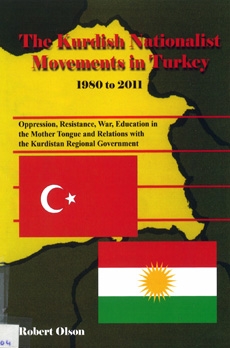|
INTRODUCTION
This book deals almost exclusively with the Kurdish Nationalist Movements (KNMs) in Turkey, although this meant in the 1980s that the conflict between the Turkish state and the Kurds, especially the PKK—Kurdistan Workers Party—had already greatly affected the KNMs in Iraq. The creation of a “safe haven” for the Kurds north of the 36lh parallel by the Americans, British and French, in the wake of the war notably was instituted at the behest of Turgut Ozal, president of Turkey, who was concerned about a Hood of Kurds from Iraq into Turkey. From the creation of the "safe haven" in 1991 and the impetus it gave to the strengthening of Kurdish nationalism in Iraq and Turkey, the two countries' future political configurations have been ever more closely intertwined. In 1992 the “safe haven” became the nucleus of the Kurdistan Region Government (KRG) and by the time of the first post-war constitution in 2005. the KRG had become the strongest Kurdish political entity in the Middle East since medieval times. Although an independent state called the Kurdish Republic of Mahabad had been founded in late 1945, it only lasted until December 1946. It never achieved the strength or gained the international recognition of the KRG.
The creation of the “safe haven” for Kurds in northern Iraq did not prevent the Turkish Armed Forces (TAF) from making frequent incursions into northern Iraq throughout the 1990s. Large scale air attacks accompanied by land incursions against the PKK continued right up to late 2007 and early 2008. Because of the depletion of their armed forces and economies as a result of their 1980-1988 war, neither Baghdad nor Tehran were able to make any significant armed attacks on the PKK and their camps ensconced in the Kandil Mountains’ region; indeed, most of the KNMs in Iraq were aligned with Iran during the war. The government in Baghdad was happy to acquiesce to Turkey’s incursions since they were unable to secure the region themselves.
The Iraq-Iran war provided the instance for the KNMs of Turkey and Iraq to become more enmeshed. By the end of 2010, Turkey, Iraq and the KNMs of both countries had become inextricably entangled. It was not clear in 1991 after the first US-led war against Iraq or even after the second US war against Iraq that the Kurds of Iraq would achieved what became a de facto state in northern Iraq and that by the end of 2010 the Kurds of Turkey would be demanding democratic autonomy of the heavily populated Kurdish regions of Turkey. Thus, the end of 2010 resulted in an unprecedented and unimaginable strengthening of KNMs throughout the Middle East.
I argue in this essay that the developments between 1991 and 2010 have made obsolete and meaningless the terms “Kurdish Question”, “Kurdish Problem", “Kurdish Issue”, which were / are used by almost all scholars and analysts who write on subjects dealing with aspects of Kurdish history and / or politics. The “question”, “problem”, or “issue”, parts of the expression refer to the multitude of policies, coercive instruments and armed force that Turkey, Iraq, Iran and Syria used / use to restrain, curtail, quell, crush and destroy various KNMs', rebellions, revolts and resistance that occurred throughout the 19th and 20th centuries as well as the first decade of the 21st century.
Throughout the 30 year span covered in this essay, all four states, especially Turkey and Iraq, used nearly every conceivable force imaginable to crush KNMs. This included ethnic cleansing operations in both countries. While the ethnic cleansing practices, including gas attacks, of the Ba’thist regime in Iraq, arc well known, especially as a result of the poison gas attack on the Kurdish city of Halabja in March 1988, the ethnic cleansing practices of Turkey against the Kurds, especially after the commencement of armed conflict after 1984. are less well known. Neither Turkey’s European nor American allies were desirous of making a public issue of their NATO ally’s brutal campaigns against the Kurds in the 1980s and 1990s and right through the first decade of the 21st century. During this period of time both European countries and the US characterized the PKK as a terrorist organization, although some NGOs and other organizations in Europe were sympathetic to Kurds’ plight.
The ethnic cleansing practices of the TAF with the approval of government institutions resulted in a hemorrhaging of Kurds ...
| 